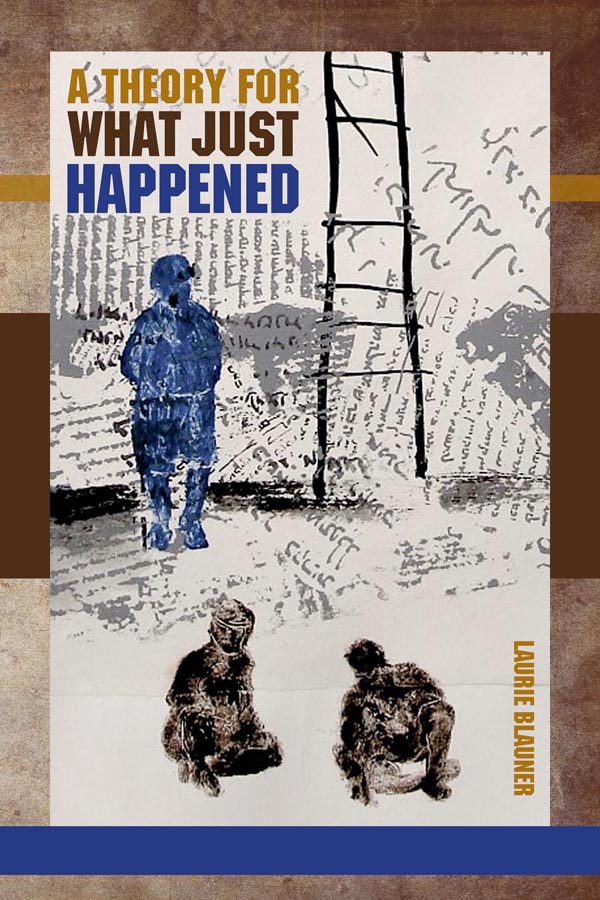
|
A Theory for What Just Happened
by Laurie Blauner
Available now from FutureCycle Press.
Or go here to purchase Kindle or paperback edition.
In
Laurie Blauner’s new book of poetry, a sentence attends a dinner party,
a parent wishes her teenage daughter would be more afraid, a very human
plant is filled with usable light, a ruined forest houses a king and
his daughter, men land on the moon, and a war continues without men.
Personal, societal, political, and environmental changes develop into
warnings, disasters, and mechanical failures. Some examples are “a
still life with nervous animals,” and “devices meant to resemble our
bodies.” Something is coming. Then the catastrophes begin. Engagement,
surprise, fear, and love (with too many distractions) surface, “…even
happy little books leave traces.” With compelling, imaginative, and
varied language and metaphors a precarious balance between the familiar
and unfamiliar is attained. Cliches are overturned, inverted, or made
into something new. Blauner writes, “The world looked away from us just
when we needed it the most.”
|
To hear Laurie read several poems from this book, click here.
Praise for A Theory for What Just Happened (from Misfit Magazine, Spring 2021)
Laurie Blauner’s latest collection is so rich and diverse, a brief
review cannot capture the scope and the range of her work. There are three
intimately connected sections: Shy Instruments of Understanding, Warn the
Others and Still Life with Nervous Animals. More than a mere
cautionary tale, these apocalyptic visions feel more like the revelations of a
mythic oracle on the brink of imminent disaster than poems. Often
dreamlike, the initial poems show a society that, despite all of its technical
devices of personal informational sharing, this society is fundamentally unable
to communicate in a visceral, truthful manner. Information is facile,
misleading, and downright stupefying, as in as fanciful as it is stupid.
Conclusions are reached but they are almost always the wrong, most
harmful, expedient as opposed to forward thinking ones. Disinformation
replaces truth and the result is chaos and, inevitably, disaster.
When I began reading Warn the Others, I thought of the concluding scenes in the
original “Invasion of the Body Snatchers”. The last of the humans not subsumed
by the alien pod people, runs out into the freeway, past the trucks loaded down
with the pods that reconstruct humans into something else not quite human once
they fall asleep, and no one will stop and listen to the warning, “They are here.”
The movie may be remade but the result remains the same.
Climate change is coming, the world is severely out of balance. We
look for the signs that spells out Dystopia Now!
“The dog knew everything and I tried to forget him
until it was my turn. Black fur outside,
gravity inside. He counted birds,
in unusual arrangements. I took him into the woods,
which mistook me for someone else.
Creatures opened their throats like women persuading
Us with words: mysterious, wolves, weighty, arbitrary sky,
Inept shade. I
was right about rancid leaves,
A woman screaming, her family buried deeply inside
One another. They mistook me for what they already said.”
(from Mistaken Selves in an Accident)
This is a world in flux, the elemental music of the spheres is in
the key of metaphysical distress. The world is so outside of time it is almost
mythological in its dislocation. We now have an unnatural world instead of a
natural one: spoiled weather, exhausted light, diseased lightning. We have
nature poems without nature.
By the third section, what once might have been considered surreal is now
normal. We have Dali silhouettes morphing into landscapes, interiors of a
Georgia O’Keeffe skull as a skyscape reflecting the night as if it were the sun
once all the light had all been sucked out of its core. The first person
familiar is at odds with the environment, coming of age poems become elemental,
describing a stepping outside of time rather than personal growth. We are all
locked into a nightmare reflected endlessly in hall of mirrors where all the
selves that are reflected back are pieces of a puzzle that will never connect.
In my right hand is everything that is on the left. There could be a solution
to all the problems posed, to everything turned upside down, maybe. Look behind
the dark concealing curtain. It’s up to you what you find there. Perhaps,
looking matters more than what is found. So it goes.
|
